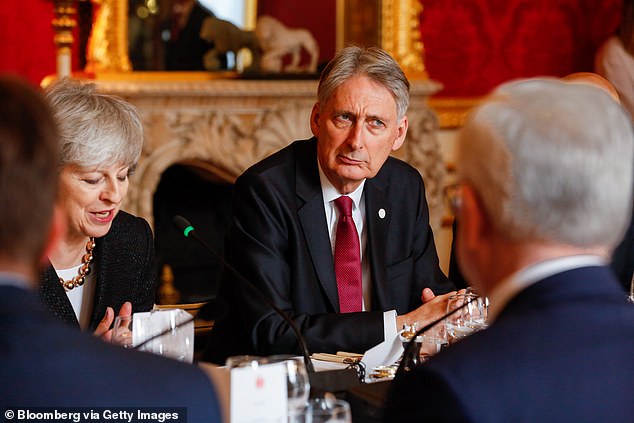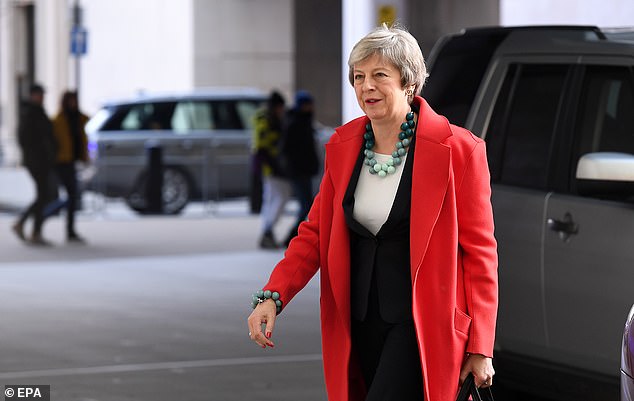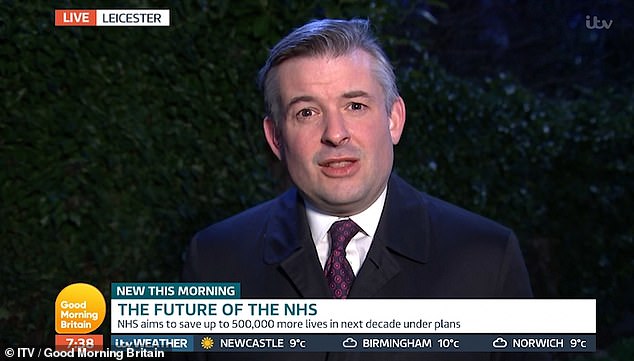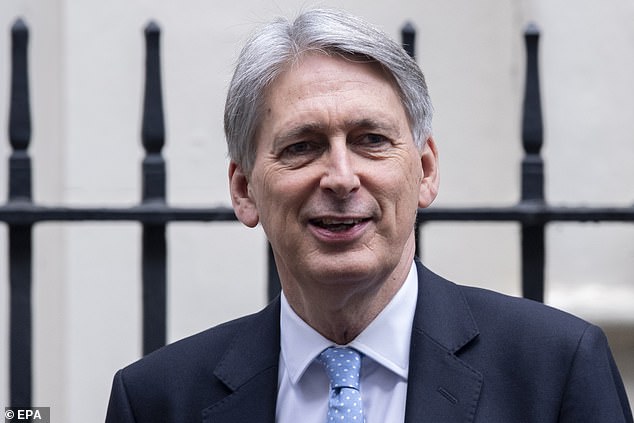We’ll save 500,000 more lives, vows NHS: Ten-year plan will provide DNA-tailored treatment to children with cancer and crack down on heart disease and strokes – despite fears of £1bn budget black hole
- Follows Theresa May’s pledge to hand NHS an extra £20billion in 10-year plan
- Doctors will also carry out DNA testing for genetic causes of high cholesterol
- PM and NHS leaders will reveal NHS blueprint at a Liverpool conference today
- But critics say there are not enough staff for planned improvements to succeed
- And past research has claimed the funding boost will be sunk in day-to-day costs
NHS leaders have vowed to save 500,000 more lives through a 10-year plan which will see DNA-tailored cancer treatment for children – despite warnings it faces a £1billion hole in this year’s budget.
The world-first promise is unveiled today as part of a long-awaited plan for the health service, which includes promises to prevent heart attacks and strokes, and crack down on alcohol abuse and smoking.
It follows Theresa May’s pledge to hand the NHS an extra £20billion per year, but a senior policy analyst at the Nuffield Trust think-tank has warned the NHS will be still be short because of pay rises and growing patient numbers.
Sally Gainsbury told the Times: ‘The combined impact of staff pay rises, inflation and growing numbers of patients mean it will face a cost pressure of £7.3billion.
‘That would leave the NHS over £1billion short, despite the extra funding.’
Writing in the Daily Mail today, Chancellor Philip Hammond has already warned the health service must drastically improve efficiency to ensure the cash isn’t wasted.
And the plan also came under fire from the Labour Party, which said the NHS doesn’t have enough staff to deliver on the ‘big bold ambitions’.
Today’s announcement was expected to include a chapter on tackling the staff crisis but that section has reportedly been delayed until later in the year.

Philip Hammond, pictured at a session of the UK-Poland Inter-Governmental Consultations in London last month, has warned the health service must drastically improve efficiency to ensure the cash isn’t wasted

Theresa May is set to announce that all children with cancer will have their treatment tailored to their DNA under an NHS bid to save more than 500,000 lives, as part of a new NHS blueprint

Jonathan Ashworth, Labour’s Shadow Health Secretary, this morning said he wasn’t convinced the NHS has enough staff to deliver on the ‘ambitious’ proposals in the 10-year plan – the chapter relating to tackling the staffing crisis has been delayed, according to reports
The funding boost promised by Mrs May will increase the NHS’s budget from around £115bn per year to £135bn by 2023/24.
Chancellor Mr Hammond, who had reservations over supplying the money, said: ‘The public hates waste in the NHS and quite rightly want to know that their taxes are spent effectively, to deliver excellent front-line services to patients.’
There are lingering tensions between No 10 and the Treasury over the issue, with some in the Treasury worried about repeating the waste of the New Labour years.
And Labour has concerns the staffing crisis – the NHS is short of at least 100,000 nurses, doctors and other staff – will make the plan difficult to complete.
Shadow Health Secretary Jonathan Ashworth told Good Morning Britain today: ‘My concern is that whereas the NHS leadership have drawn up an ambitious plan to improve healthcare in the country the Government haven’t kept up their side of the bargain.
‘We don’t have the staff to deliver the big bold ambitions we’re delivering today.
‘The Government doesn’t have a clue how they’re going to deliver the extra staff and nurses we need. Look again at the funding and give us the staff we need.’
Among the pledges made in the 10-year plan are one to record the DNA of every child with cancer in a bid to beat the disease.
Doctors will also carry out genetic testing to identify patients with an inherited condition which gives them dangerously high levels of cholesterol.
And the latest artificial intelligence technology will be brought in to better diagnose when patients have suffered a stroke – to ensure they get the right treatment quickly.
At the same time, digital GP consultations – on smartphones or tablets – will be made available to everyone who wants them as officials try to slash long waits for appointments.
NHS chiefs believe the plan, which is being funded by Theresa May’s pledge to hand the NHS an extra £20billion, will save half a million lives over the next decade.
The Prime Minister and NHS leaders are expected to reveal the full details of the blueprint today at an event at Alder Hey Children’s Hospital in Liverpool.
One of the most eye-catching measures is the move to offer whole genome sequencing to around 1,800 seriously-ill children a year with cancer or rare genetic conditions to develop more personalised medicines.
Patients will be asked to consent for their genomes data – complete DNA sequences – to be analysed to develop new tests and treatments for cancer and other diseases.
Last night, Emma Greenwood, of Cancer Research UK, welcomed the ‘ambitious’ plans.
She said: ‘Being able to offer children with cancer gene testing as part of their care means more children will benefit from better access to precision medicines.’
Researchers say using artificial intelligence to diagnose when someone has had a stroke – another planned development – can improve their treatment and survival.
It can help medics administer the best treatment to patients more quickly in emergencies, predict a person’s likelihood of developing dementia and potentially pave the way for more personalised medicine.
Yesterday, Mrs May said despite the NHS repeatedly missing key waiting times targets, she was confident the ten-year plan will ‘provide the best possible care for every major condition, from cradle to grave’.
Preventing ill health in the first place will also be key to reducing pressures on the NHS, leaders warn, with patients encouraged to adopt healthier lifestyles.
Exercise and healthy living programmes will be rolled out to 100,000 people with heart complaints, potentially saving 23,000 people from dying prematurely.
Hospital staff will be told to target problem drinkers, offer counselling to patients who are smokers and encourage those at risk of type 2 diabetes to take preventative action.
While alcohol abuse is one of the biggest causes of early death and is specifically targeted in the plan, Health Secretary Matt Hancock said at the weekend he would not bring in minimum unit pricing.
Mr Hancock claimed it was ‘perfectly healthy’ for people to drink in line with officially recommended levels, admitting he enjoys the occasional pint himself.
He said he objected to ‘punishing the masses for the problems that only a minority have’.
This was despite research earlier in the year declaring there is ‘no safe level’ of alcohol for people to drink because booze increases the risk of various cancers.
Britain’s survival rates for cancer are among the worst in Europe, with late diagnosis needlessly costing thousands of lives a year.
But health bosses are confident they can turn this around and increase early diagnosis rates from just 52 per cent now to 75 per cent within a decade.
Tens of thousands more doctors and nurses have been promised to alleviate current shortages, although a full workforce plan won’t be revealed until later this year.
Simon Stevens, chief executive of NHS England, said the plan ‘tackles head on’ the pressures faced by health staff.
He said: ‘It keeps all that’s good about our health service and its place in our national life… And it sets a practical, costed, phased route map for the NHS’s priorities for care quality and outcomes improvement for the decade ahead.’
Dr Jennifer Dixon, chief executive of think-tank the Health Foundation, described proposed changes as ‘pragmatic’ and ‘ambitious’ visions to improve the NHS but agreed with concerns about staff shortages.
Dr Dixon said: ‘Making them a reality will be extremely tough given growing pressures on services, chronic staff shortages, and cuts to other parts of the health and care system.
And she added: ‘A no-deal Brexit risks making the NHS’s problems even worse. Currently there is a shortage of around 100,000 doctors, nurses and other crucial NHS staff.’
The British Medical Association echoed the sentiment, criticising the plan for not laying out plans to train new staff.
Chairman of the BMA council, Dr Chaand Nagpaul said: ‘Fundamental to the expansion of cutting-edge treatments and digital consultations is to first get the basics right, such as the workforce.
‘There is no use in opening the digital front door to the health service if we don’t have the healthcare staff behind it.
‘While the Government has highlighted plans to expand capacity and grow the workforce, very little has been offered in the way of detail.
‘Given that there are 100,000 staff vacancies within the NHS, the long-term sustainability of the health service requires a robust workforce plan that addresses the reality of the staffing crisis across primary, secondary and community care.
‘This will require additional resources for training, funding for which has not been mentioned in the long-term plan.’
Industry magazine the Nursing Times yesterday reported a chapter of the plan relating to the staffing shortage has been delayed.
The section was expected to be released as part of the full document, but the Government has now indicated it will come later in the year.
The NHS’s own executives have even criticised this delay.
The chief executive of NHS Confederation, Niall Dickson said: ‘To meet the government’s ambitions for the NHS over the next decade we need the right staff with the right skills.
‘With 100,000 vacancies across the NHS in England, even if you gave the health service its £20bn up front, it would not be able to provide the care people need.
‘It is, therefore, disappointing that the planned workforce strategy looks as if it will be delayed until later this year.’
Dr Nick Scriven, president of the Society for Acute Medicine, said he was ‘staggered’ the key priorities ‘overlooked emergency care and hospital capacity’.
‘Today’s lack of acknowledgement of how we effectively tackle the eternal winter in the NHS and its associated problems,’ he said, ‘is indicative of how acute and emergency care is the poor relation when it comes to priorities.’
British think-tank The Institute for Public Policy Research last month claimed the promised budget boost wouldn’t even be enough to soak up current NHS spending.
Experts there said unless the health service becomes drastically more efficient, the billions of extra pounds would just be spent on day-to-day running costs.
Staff pay rises and pensions, caring for over-75s, increasing drug prices, operating costs and hospital deficits are expected to swallow up the money.
In the best case scenario, its report said, the health service could use £5.2billion of the money for improvements.
From childbirth to mental care, a 10-year blueprint
MATERNITY
A package of measures for maternity services promises to make the NHS ‘the best place in the world to give birth’.
More nurses and specialist staff will be brought in over the next five years as part of a plan to redesign neonatal services from pregnancy to early motherhood.
The plans include allowing new mothers to use a smartphone to access the traditional ‘red book’ issued by the NHS for each new baby, containing their vital details.
Up to 285,000 new mothers will have better access to physiotherapy. There will also be moves to improve breastfeeding rates.
The measures are expected to halve stillbirths, maternal and infant deaths and serious brain injuries in newborn babies by 2025, saving 4,000 babies’ lives.
SMOKING AND DRINKING
Alcohol and tobacco addiction are two of the biggest causes of early death, and NHS chiefs believe they can boost the health of the nation by encouraging Britons to make better lifestyle choices.
Doctors and nurses will be on alert for suspected problem drinkers among casualty cases or those in wards or clinics, and patients could be referred to alcohol care teams. Smokers in hospital will be offered prescription drugs or counselling.

Finn, from Warminster, Wiltshire, had always dreamt of going to Lapland but his gruelling treatment programme made travelling difficult. However, in December 2017, the Quids for Kids Campaign sent Finn, parents Debbie and Andy and brother Archie to visit Father Christmas
VOLUNTEERING
The NHS wants to double the number of volunteers to up to 156,000 over the next three years. Health chiefs believe they have a huge impact on patients and staff, while greatly enhancing their own lives.
Volunteering has been shown to help older people stay active and reduce cognitive decline while younger recruits can gain invaluable experience.
The health service plan will urge hospitals to recruit many more younger volunteers, particularly those with mental health problems, learning difficulties or from deprived communities.
NHS England will encourage hospitals to offer more volunteering opportunities and by investing £2.3million in Helpforce – the charity the Daily Mail launched its Christmas campaign with, encouraging more than 30,000 readers to sign up to give their time to the NHS.
MENTAL HEALTH
The NHS will boost mental health care for under-18s with conditions such as eating disorders, self-harm and depression.
Health officials have agreed to increase the proportion of all those with a diagnosable mental health condition who get treated from one in four (25 per cent) to one in three (35 per cent) by 2020-21.
The plans include new waiting-time targets for mental health treatment and stronger support for young adults, including a 24/7 helpline.
An extra £2.3billion has been promised to pay for talking therapies for an additional 350,000 young people and 380,000 adults within five years.
Young people will no longer be forced to restart their treatment with adult services when they turn 18.
CANCER
Theresa May set the NHS a target to diagnose three quarters of cancer cases early within ten years, saving 55,000 lives.
At present, 52 per cent of cancers are diagnosed at stages one and two, when the tumour is small and has not spread to surrounding tissue.
This will increase to 75 per cent by 2028. Screening programmes will be more accessible, easier to use, and based on the latest research and technology.
New tests for bowel cancer, mobile lung screening units, and the rollout of rapid diagnostic centres across the country with same-day testing will offer cutting edge options for early diagnosis to those at risk.
SOUP AND SHAKE DIET
A low-calorie ‘soup and shake’ diet to reverse Type 2 diabetes will be prescribed to 5,000 patients to reverse the condition.
NHS England is putting the three-month, 800-calories-a-day regime at the heart of its diabetes strategy after half of patients went into remission in trials.
The number of Britons with diabetes has doubled in 20 years. Almost 3.7million people are living with diabetes, up from 1.9million in 1998.
Philip Hammond: Let’s drive innovation and efficiency to secure an NHS fit for the future
Many will have spent Christmas surrounded by their loved ones, enjoying a well-deserved break over the holidays. But not the hundreds of thousands of NHS staff working all hours to provide care in a health service that is the envy of the world. We salute their commitment.
And we owe it to them that as Parliament returns we are getting on with publishing the NHS’s 10-year plan. Far from the noise of Westminster debate, the actions set out in this plan explain how the huge financial commitment we have made to the NHS will be translated into actions that deliver better, more reliable, more accessible and more consistent health services across England. Growing our NHS so it is fit for the future.
As I said in the Budget, the NHS is the government’s number one spending priority and that is why last June we committed to a cash settlement that provides a real terms increase of £20.5bn a year by 2023-24.
The funding increase will add to its financial security and support investment in change. And it’s this financial security that has allowed it to plan for the next ten years – to deliver improving performance, better cancer care, greater access to mental health services and much more.
A crucial part of this plan, and one we can’t ignore, is ensuring the NHS delivers care efficiently. The public hates waste in the NHS and quite rightly want to know that their taxes are spent effectively, to deliver excellent front-line services to patients. In the Budget, I announced how we would fund the increased spending without placing an additional burden on hardworking families.
So the plan sets out how we can improve the NHS’s current offer, ensuring that we meet the standards that the public expect, as well as exploring new and ground-breaking treatments. It is only by efficiently delivering the current service that the NHS can free-up resources to begin to expand what the NHS can offer and deliver new treatments, and it is the combination of the two that will put the health service on a sustainable footing. But first we must fix the current system so that it is working effectively for everyone.

Philip Hammond said: ‘The leaders of the NHS must now get on and deliver. The country will rightly be looking to them to ensure this great institution is developed to make it safer, more effective and more efficient as it adopts more modern ways of working that reflect how we expect a public service to operate in 2019’
To meet this challenge, we must go back to our roots. We must be innovative, rekindling the pioneering spirit that saw British researchers in the ’50s discover DNA and develop a vaccination programme that eventually eradicated polio; the introduction of CT scans in 1972 and the first heart, lung and liver transplants in 1990. Then there was the relentless fight against cancer, from the introduction of breast screening in 1998 to reduce deaths in women over 50; to vaccination of teenage girls to prevent cervical cancer from 2008, to last year’s introduction of the ground-breaking CAR-T therapy that works by re-programming the patient’s own immune system to target their cancer. The fight against cancer goes on, and we will continue to up the pace.
We in Britain built a health system which defied the naysayers to deliver comprehensive free healthcare at the point of delivery. A system that pushed the boundaries and must do so again to deliver the needs of an ageing population in the 21st century.
The leaders of the NHS must now ensure they get the basics right. Alongside greater quality of care and ending waste, the public will demand that progress is made on the back of their investment.
That means more efficient services: more digital, less paper; more services available in GP surgeries rather than needing a trip to a hospital; and one person being able to deal with your needs rather than sending you to see different people in different places. One set of questions and answers!
Only through efficiency will we improve the quality of care and give people the service they need. Because we believe in the NHS, we must ensure it remains fit for purpose – so that people get the right care at the right time in the right setting. That might be at a local GP’s surgery, or even in the reassuring comfort of their own home; or it may be in a high-tech hospital.
Our country must be match-fit to face the challenges ahead as we leave the EU, and our health system must be ready to support us in that.
We are doing our bit – building on this government’s strong record of investment in public services by providing a record amount of funding. This means money for more doctors, nurses and health professionals. And additional funds for hospitals to buy new equipment.
But with this financial backing – that can only be afforded as our top spending priority – comes responsibility.
The leaders of the NHS must now get on and deliver. The country will rightly be looking to them to ensure this great institution is developed to make it safer, more effective and more efficient as it adopts more modern ways of working that reflect how we expect a public service to operate in 2019.
We believe in the National Health Service. This plan is testament to our determination to make it fit for the generations to come.

